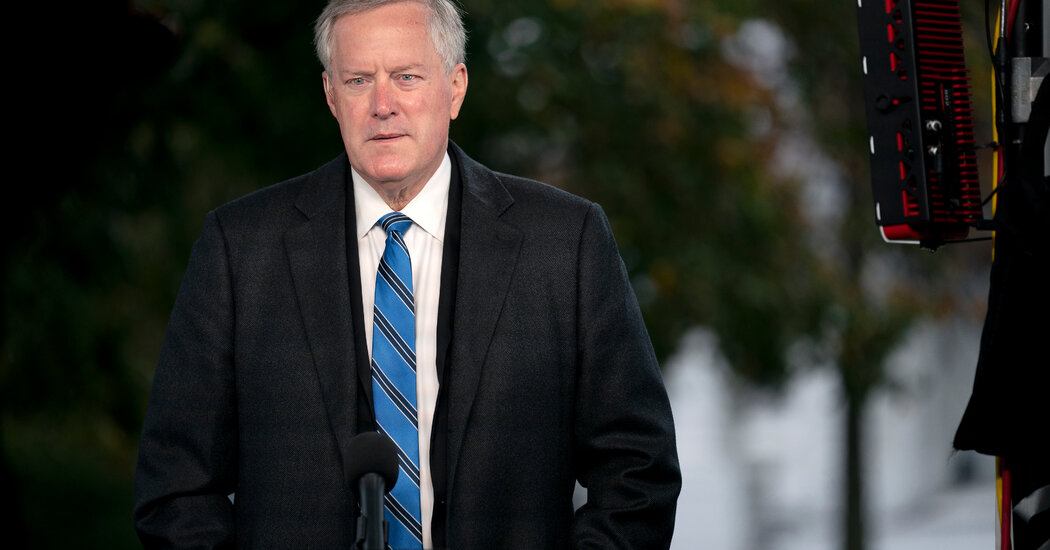
WASHINGTON — The select committee investigating the Jan. 6 attack on the Capitol subpoenaed four of President Donald J. Trump’s closest advisers on Thursday, ramping up its scrutiny of what the former president was doing before and during the deadly riot.
The subpoenas, the first the panel has issued, seek information from Mark Meadows, the former White House chief of staff; Dan Scavino Jr., who was a deputy chief of staff; Stephen K. Bannon, Mr. Trump’s former adviser; and Kash Patel, the former Pentagon chief of staff.
The committee is demanding that the four men turn over documents by Oct. 7 and submit to depositions the following week.
“The select committee is investigating the facts, circumstances and causes of the Jan. 6 attack, and issues relating to the peaceful transfer of power, in order to identify and evaluate lessons learned and to recommend to the House and its relevant committees corrective laws, policies, procedures, rules or regulations,” Representative Bennie Thompson, Democrat of Mississippi and chairman of the committee, wrote in a statement announcing the subpoenas.
In letters transmitting the orders, the committee said it was seeking information about Mr. Trump’s actions in the run-up to and during the riot. Mr. Bannon reportedly communicated with Mr. Trump on Dec. 30 and urged him to focus his efforts on Jan. 6, the committee said. He also was present at a meeting at the Willard Hotel the day before the violence, when plans were discussed to try to overturn the results of the election the next day, the committee stated. He was quoted as saying, “All hell is going to break loose tomorrow.”
Mr. Meadows was involved in the planning of efforts to subvert the results of the election, the committee asserted. In Mr. Trump’s final weeks in office, he repeatedly pushed the Justice Department to investigate unfounded conspiracy theories about the 2020 presidential election, according to emails provided to Congress, portions of which were reviewed by The New York Times.
Mr. Meadows was also in communication with organizers of the rally on Jan. 6 that preceded the violence, including Amy Kremer of Women for America First, the committee said.
Mr. Scavino was in contact with Mr. Trump and others who planned the rallies that preceded the violence of Jan. 6, and met with Mr. Trump on Jan. 5 to discuss how to persuade members of Congress not to certify the election for President Biden, the committee said.
Mr. Scavino promoted the Jan. 6 March for Trump on Twitter, encouraging people to “be a part of history.” Records indicate that Mr. Scavino was tweeting messages from the White House on Jan. 6, according to the panel.
Mr. Patel was serving as chief of staff to acting Secretary of Defense Christopher C. Miller during the attack, after Mr. Trump appointed him to replace Mark T. Esper as the top Pentagon official. According to documents provided by the Defense Department and published accounts, Mr. Patel was involved in discussions among senior Pentagon officials before and during the attack regarding security at the Capitol. Mr. Patel also was reportedly in constant contact with Mr. Meadows the day of the assault, the committee said.
The committee said it was scrutinizing reporting that the former president attempted to install Mr. Patel as deputy director of the C.I.A. in early December, a plan abandoned after Gina Haspel, the director at the time, threatened to resign.
“I am disappointed, but not surprised, that the committee tried to subpoena me through the press and violated longstanding protocol — which I upheld as a congressional staffer — by resorting to compulsory process before seeking my voluntary cooperation,” Mr. Patel said in a statement. “I will continue to tell the truth to the American people about the events of Jan. 6.”
Mr. Bannon, Mr. Meadows and Mr. Scavino did not immediately respond to requests for comment.
The subpoenas come as the committee has demanded detailed records about Mr. Trump’s every movement and meeting on the day of the assault, in requests to federal agencies that suggested it was focusing on any involvement the former president might have had in the attack’s planning or execution.
Their swift issuance indicates that the panel is moving aggressively on its investigation, without pausing to negotiate with key witnesses who could furnish important information.
“Quick subpoenas like this are a sign they’re not messing around,” Elliot Williams, a legal analyst, wrote on Twitter.
The panel is scrutinizing what led to the violence that engulfed the Capitol as supporters of Mr. Trump stormed the building, brutalizing police officers and delaying for hours the official counting of electoral votes to formalize Mr. Biden’s victory. Little is known about what the former president was doing as he watched the mayhem unfold, or in the days leading up to it.
The committee sent record preservation demands last month to 35 technology companies, according to several people familiar with the documents who spoke about their contents on the condition of anonymity. Among hundreds of people whose records the committee is seeking to preserve are about a dozen House Republicans, including Representative Kevin McCarthy, the minority leader, who has threatened to retaliate against any company that complies.
On Thursday, Mr. McCarthy again criticized the committee, calling its work “more about politics than anything else.”
“There’s only two questions that this committee should actually be looked upon: Why was the Capitol left so ill-prepared, and how can we make sure this never happens again?” he said. “But that’s not what they’re focused on.”







